Entrepreneurship and Small Business Management: Task 1 Detailed Report
VerifiedAdded on 2023/06/16
|16
|4330
|363
Report
AI Summary
This report examines various types of entrepreneurial ventures, including small-business, large company, scalable start-up, social, public, and private entrepreneurship, and relates them to the typology of entrepreneurship, highlighting male, female, lifestyle, and survival entrepreneurs. It assesses the impact of micro and small businesses on the economy, particularly in the UK, using relevant data and statistics to illustrate their contribution to employment, innovation, and overall economic growth. The report further explains the importance of small businesses and start-ups to the growth of the social economy, emphasizing their role in enriching underprivileged communities and generating employment. It also determines the characteristic traits and skills of successful entrepreneurs, differentiating them from other business managers, using examples like Richard Branson and Sarah Jane Brown to illustrate key qualities such as risk-taking, flexibility, creativity, and leadership. Finally, it assesses how aspects of the entrepreneurial personality reflect entrepreneurial motivation and mindset and examines how background and experience can either hinder or foster entrepreneurship. Desklib provides access to similar solved assignments and past papers for students.

Entrepreneurship and
Small Business
Management
Small Business
Management
Paraphrase This Document
Need a fresh take? Get an instant paraphrase of this document with our AI Paraphraser
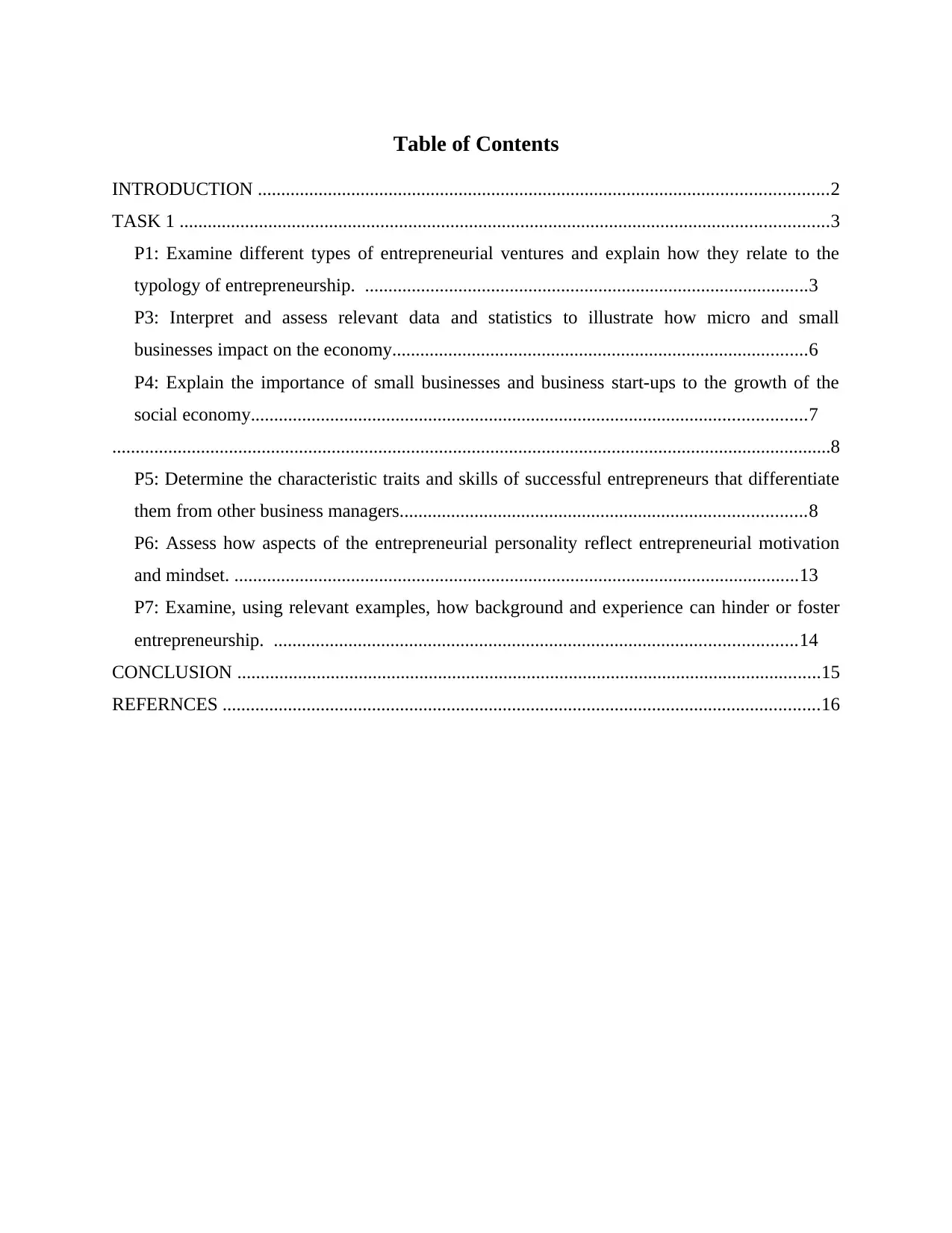
Table of Contents
INTRODUCTION ..........................................................................................................................2
TASK 1 ...........................................................................................................................................3
P1: Examine different types of entrepreneurial ventures and explain how they relate to the
typology of entrepreneurship. ...............................................................................................3
P3: Interpret and assess relevant data and statistics to illustrate how micro and small
businesses impact on the economy.........................................................................................6
P4: Explain the importance of small businesses and business start-ups to the growth of the
social economy.......................................................................................................................7
..........................................................................................................................................................8
P5: Determine the characteristic traits and skills of successful entrepreneurs that differentiate
them from other business managers.......................................................................................8
P6: Assess how aspects of the entrepreneurial personality reflect entrepreneurial motivation
and mindset. .........................................................................................................................13
P7: Examine, using relevant examples, how background and experience can hinder or foster
entrepreneurship. ................................................................................................................14
CONCLUSION .............................................................................................................................15
REFERNCES ................................................................................................................................16
INTRODUCTION ..........................................................................................................................2
TASK 1 ...........................................................................................................................................3
P1: Examine different types of entrepreneurial ventures and explain how they relate to the
typology of entrepreneurship. ...............................................................................................3
P3: Interpret and assess relevant data and statistics to illustrate how micro and small
businesses impact on the economy.........................................................................................6
P4: Explain the importance of small businesses and business start-ups to the growth of the
social economy.......................................................................................................................7
..........................................................................................................................................................8
P5: Determine the characteristic traits and skills of successful entrepreneurs that differentiate
them from other business managers.......................................................................................8
P6: Assess how aspects of the entrepreneurial personality reflect entrepreneurial motivation
and mindset. .........................................................................................................................13
P7: Examine, using relevant examples, how background and experience can hinder or foster
entrepreneurship. ................................................................................................................14
CONCLUSION .............................................................................................................................15
REFERNCES ................................................................................................................................16
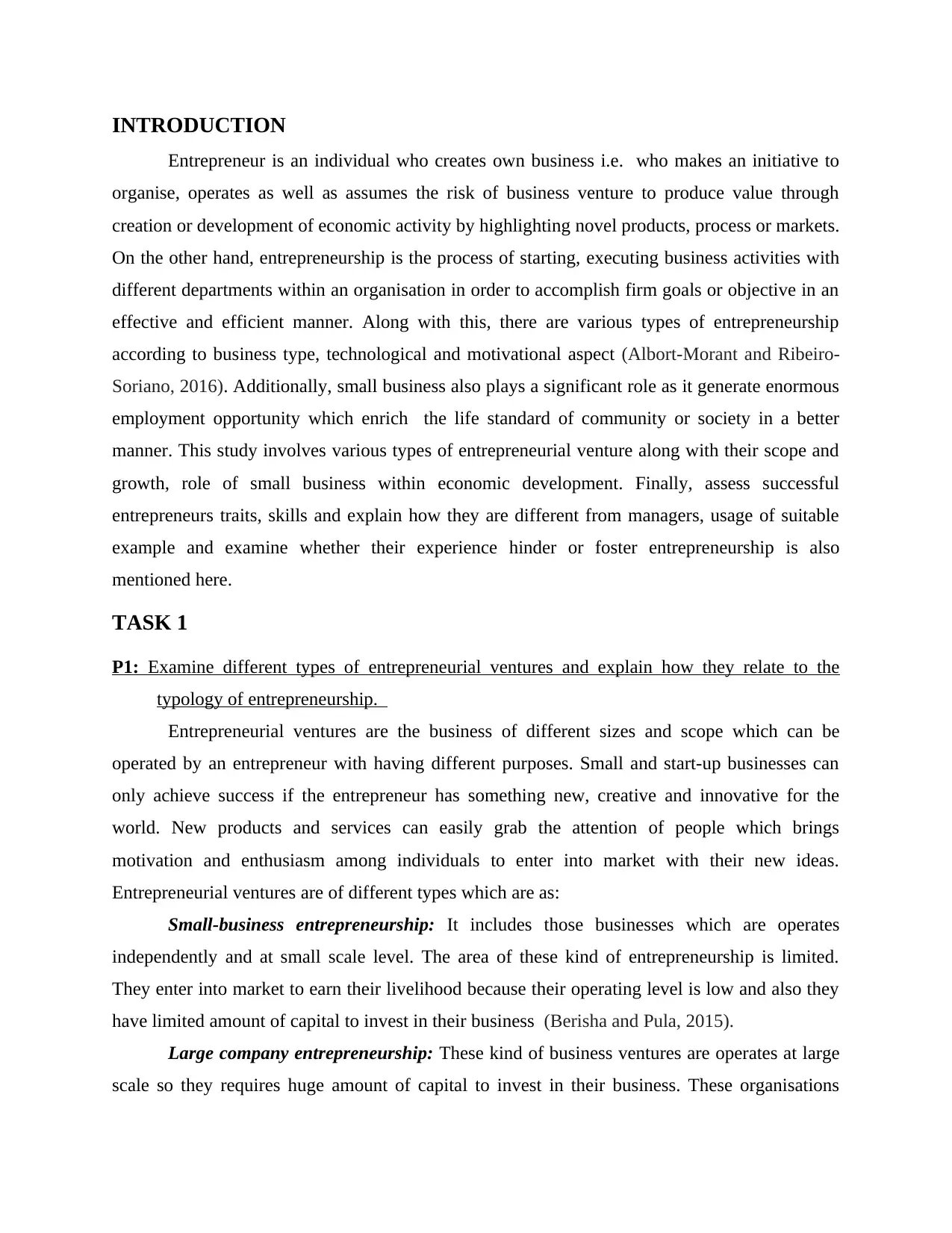
INTRODUCTION
Entrepreneur is an individual who creates own business i.e. who makes an initiative to
organise, operates as well as assumes the risk of business venture to produce value through
creation or development of economic activity by highlighting novel products, process or markets.
On the other hand, entrepreneurship is the process of starting, executing business activities with
different departments within an organisation in order to accomplish firm goals or objective in an
effective and efficient manner. Along with this, there are various types of entrepreneurship
according to business type, technological and motivational aspect (Albort-Morant and Ribeiro-
Soriano, 2016). Additionally, small business also plays a significant role as it generate enormous
employment opportunity which enrich the life standard of community or society in a better
manner. This study involves various types of entrepreneurial venture along with their scope and
growth, role of small business within economic development. Finally, assess successful
entrepreneurs traits, skills and explain how they are different from managers, usage of suitable
example and examine whether their experience hinder or foster entrepreneurship is also
mentioned here.
TASK 1
P1: Examine different types of entrepreneurial ventures and explain how they relate to the
typology of entrepreneurship.
Entrepreneurial ventures are the business of different sizes and scope which can be
operated by an entrepreneur with having different purposes. Small and start-up businesses can
only achieve success if the entrepreneur has something new, creative and innovative for the
world. New products and services can easily grab the attention of people which brings
motivation and enthusiasm among individuals to enter into market with their new ideas.
Entrepreneurial ventures are of different types which are as:
Small-business entrepreneurship: It includes those businesses which are operates
independently and at small scale level. The area of these kind of entrepreneurship is limited.
They enter into market to earn their livelihood because their operating level is low and also they
have limited amount of capital to invest in their business (Berisha and Pula, 2015).
Large company entrepreneurship: These kind of business ventures are operates at large
scale so they requires huge amount of capital to invest in their business. These organisations
Entrepreneur is an individual who creates own business i.e. who makes an initiative to
organise, operates as well as assumes the risk of business venture to produce value through
creation or development of economic activity by highlighting novel products, process or markets.
On the other hand, entrepreneurship is the process of starting, executing business activities with
different departments within an organisation in order to accomplish firm goals or objective in an
effective and efficient manner. Along with this, there are various types of entrepreneurship
according to business type, technological and motivational aspect (Albort-Morant and Ribeiro-
Soriano, 2016). Additionally, small business also plays a significant role as it generate enormous
employment opportunity which enrich the life standard of community or society in a better
manner. This study involves various types of entrepreneurial venture along with their scope and
growth, role of small business within economic development. Finally, assess successful
entrepreneurs traits, skills and explain how they are different from managers, usage of suitable
example and examine whether their experience hinder or foster entrepreneurship is also
mentioned here.
TASK 1
P1: Examine different types of entrepreneurial ventures and explain how they relate to the
typology of entrepreneurship.
Entrepreneurial ventures are the business of different sizes and scope which can be
operated by an entrepreneur with having different purposes. Small and start-up businesses can
only achieve success if the entrepreneur has something new, creative and innovative for the
world. New products and services can easily grab the attention of people which brings
motivation and enthusiasm among individuals to enter into market with their new ideas.
Entrepreneurial ventures are of different types which are as:
Small-business entrepreneurship: It includes those businesses which are operates
independently and at small scale level. The area of these kind of entrepreneurship is limited.
They enter into market to earn their livelihood because their operating level is low and also they
have limited amount of capital to invest in their business (Berisha and Pula, 2015).
Large company entrepreneurship: These kind of business ventures are operates at large
scale so they requires huge amount of capital to invest in their business. These organisations
⊘ This is a preview!⊘
Do you want full access?
Subscribe today to unlock all pages.

Trusted by 1+ million students worldwide
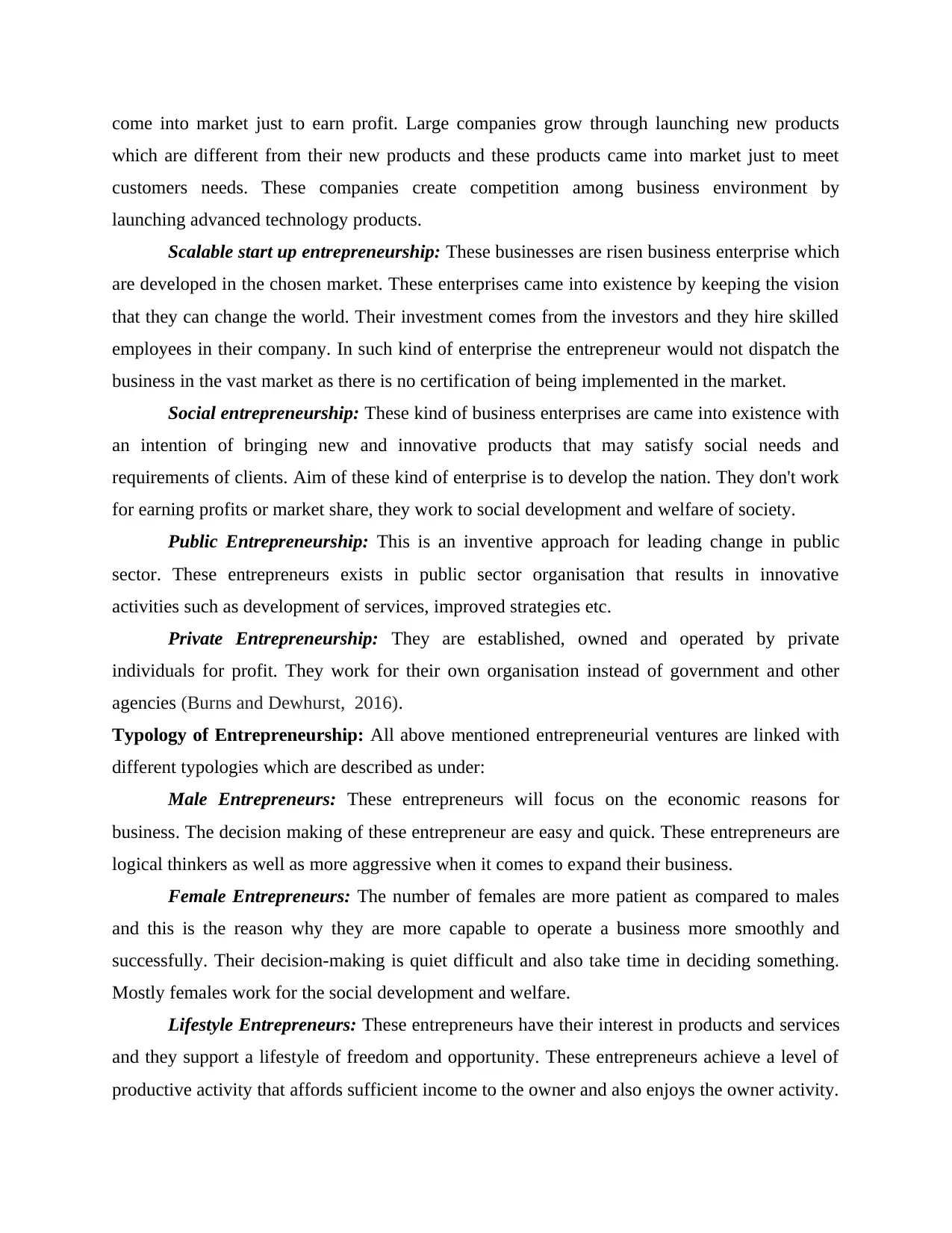
come into market just to earn profit. Large companies grow through launching new products
which are different from their new products and these products came into market just to meet
customers needs. These companies create competition among business environment by
launching advanced technology products.
Scalable start up entrepreneurship: These businesses are risen business enterprise which
are developed in the chosen market. These enterprises came into existence by keeping the vision
that they can change the world. Their investment comes from the investors and they hire skilled
employees in their company. In such kind of enterprise the entrepreneur would not dispatch the
business in the vast market as there is no certification of being implemented in the market.
Social entrepreneurship: These kind of business enterprises are came into existence with
an intention of bringing new and innovative products that may satisfy social needs and
requirements of clients. Aim of these kind of enterprise is to develop the nation. They don't work
for earning profits or market share, they work to social development and welfare of society.
Public Entrepreneurship: This is an inventive approach for leading change in public
sector. These entrepreneurs exists in public sector organisation that results in innovative
activities such as development of services, improved strategies etc.
Private Entrepreneurship: They are established, owned and operated by private
individuals for profit. They work for their own organisation instead of government and other
agencies (Burns and Dewhurst, 2016).
Typology of Entrepreneurship: All above mentioned entrepreneurial ventures are linked with
different typologies which are described as under:
Male Entrepreneurs: These entrepreneurs will focus on the economic reasons for
business. The decision making of these entrepreneur are easy and quick. These entrepreneurs are
logical thinkers as well as more aggressive when it comes to expand their business.
Female Entrepreneurs: The number of females are more patient as compared to males
and this is the reason why they are more capable to operate a business more smoothly and
successfully. Their decision-making is quiet difficult and also take time in deciding something.
Mostly females work for the social development and welfare.
Lifestyle Entrepreneurs: These entrepreneurs have their interest in products and services
and they support a lifestyle of freedom and opportunity. These entrepreneurs achieve a level of
productive activity that affords sufficient income to the owner and also enjoys the owner activity.
which are different from their new products and these products came into market just to meet
customers needs. These companies create competition among business environment by
launching advanced technology products.
Scalable start up entrepreneurship: These businesses are risen business enterprise which
are developed in the chosen market. These enterprises came into existence by keeping the vision
that they can change the world. Their investment comes from the investors and they hire skilled
employees in their company. In such kind of enterprise the entrepreneur would not dispatch the
business in the vast market as there is no certification of being implemented in the market.
Social entrepreneurship: These kind of business enterprises are came into existence with
an intention of bringing new and innovative products that may satisfy social needs and
requirements of clients. Aim of these kind of enterprise is to develop the nation. They don't work
for earning profits or market share, they work to social development and welfare of society.
Public Entrepreneurship: This is an inventive approach for leading change in public
sector. These entrepreneurs exists in public sector organisation that results in innovative
activities such as development of services, improved strategies etc.
Private Entrepreneurship: They are established, owned and operated by private
individuals for profit. They work for their own organisation instead of government and other
agencies (Burns and Dewhurst, 2016).
Typology of Entrepreneurship: All above mentioned entrepreneurial ventures are linked with
different typologies which are described as under:
Male Entrepreneurs: These entrepreneurs will focus on the economic reasons for
business. The decision making of these entrepreneur are easy and quick. These entrepreneurs are
logical thinkers as well as more aggressive when it comes to expand their business.
Female Entrepreneurs: The number of females are more patient as compared to males
and this is the reason why they are more capable to operate a business more smoothly and
successfully. Their decision-making is quiet difficult and also take time in deciding something.
Mostly females work for the social development and welfare.
Lifestyle Entrepreneurs: These entrepreneurs have their interest in products and services
and they support a lifestyle of freedom and opportunity. These entrepreneurs achieve a level of
productive activity that affords sufficient income to the owner and also enjoys the owner activity.
Paraphrase This Document
Need a fresh take? Get an instant paraphrase of this document with our AI Paraphraser
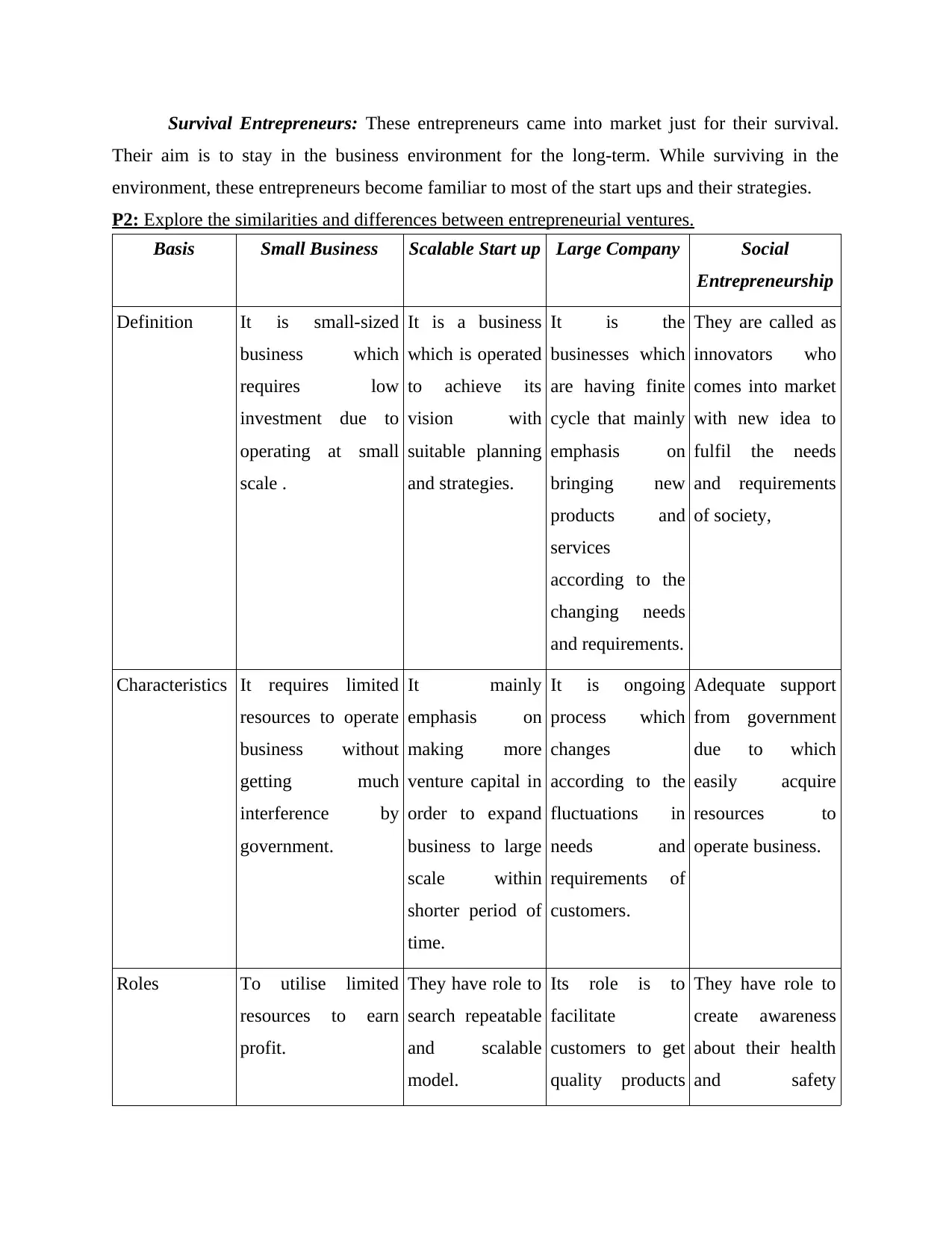
Survival Entrepreneurs: These entrepreneurs came into market just for their survival.
Their aim is to stay in the business environment for the long-term. While surviving in the
environment, these entrepreneurs become familiar to most of the start ups and their strategies.
P2: Explore the similarities and differences between entrepreneurial ventures.
Basis Small Business Scalable Start up Large Company Social
Entrepreneurship
Definition It is small-sized
business which
requires low
investment due to
operating at small
scale .
It is a business
which is operated
to achieve its
vision with
suitable planning
and strategies.
It is the
businesses which
are having finite
cycle that mainly
emphasis on
bringing new
products and
services
according to the
changing needs
and requirements.
They are called as
innovators who
comes into market
with new idea to
fulfil the needs
and requirements
of society,
Characteristics It requires limited
resources to operate
business without
getting much
interference by
government.
It mainly
emphasis on
making more
venture capital in
order to expand
business to large
scale within
shorter period of
time.
It is ongoing
process which
changes
according to the
fluctuations in
needs and
requirements of
customers.
Adequate support
from government
due to which
easily acquire
resources to
operate business.
Roles To utilise limited
resources to earn
profit.
They have role to
search repeatable
and scalable
model.
Its role is to
facilitate
customers to get
quality products
They have role to
create awareness
about their health
and safety
Their aim is to stay in the business environment for the long-term. While surviving in the
environment, these entrepreneurs become familiar to most of the start ups and their strategies.
P2: Explore the similarities and differences between entrepreneurial ventures.
Basis Small Business Scalable Start up Large Company Social
Entrepreneurship
Definition It is small-sized
business which
requires low
investment due to
operating at small
scale .
It is a business
which is operated
to achieve its
vision with
suitable planning
and strategies.
It is the
businesses which
are having finite
cycle that mainly
emphasis on
bringing new
products and
services
according to the
changing needs
and requirements.
They are called as
innovators who
comes into market
with new idea to
fulfil the needs
and requirements
of society,
Characteristics It requires limited
resources to operate
business without
getting much
interference by
government.
It mainly
emphasis on
making more
venture capital in
order to expand
business to large
scale within
shorter period of
time.
It is ongoing
process which
changes
according to the
fluctuations in
needs and
requirements of
customers.
Adequate support
from government
due to which
easily acquire
resources to
operate business.
Roles To utilise limited
resources to earn
profit.
They have role to
search repeatable
and scalable
model.
Its role is to
facilitate
customers to get
quality products
They have role to
create awareness
about their health
and safety
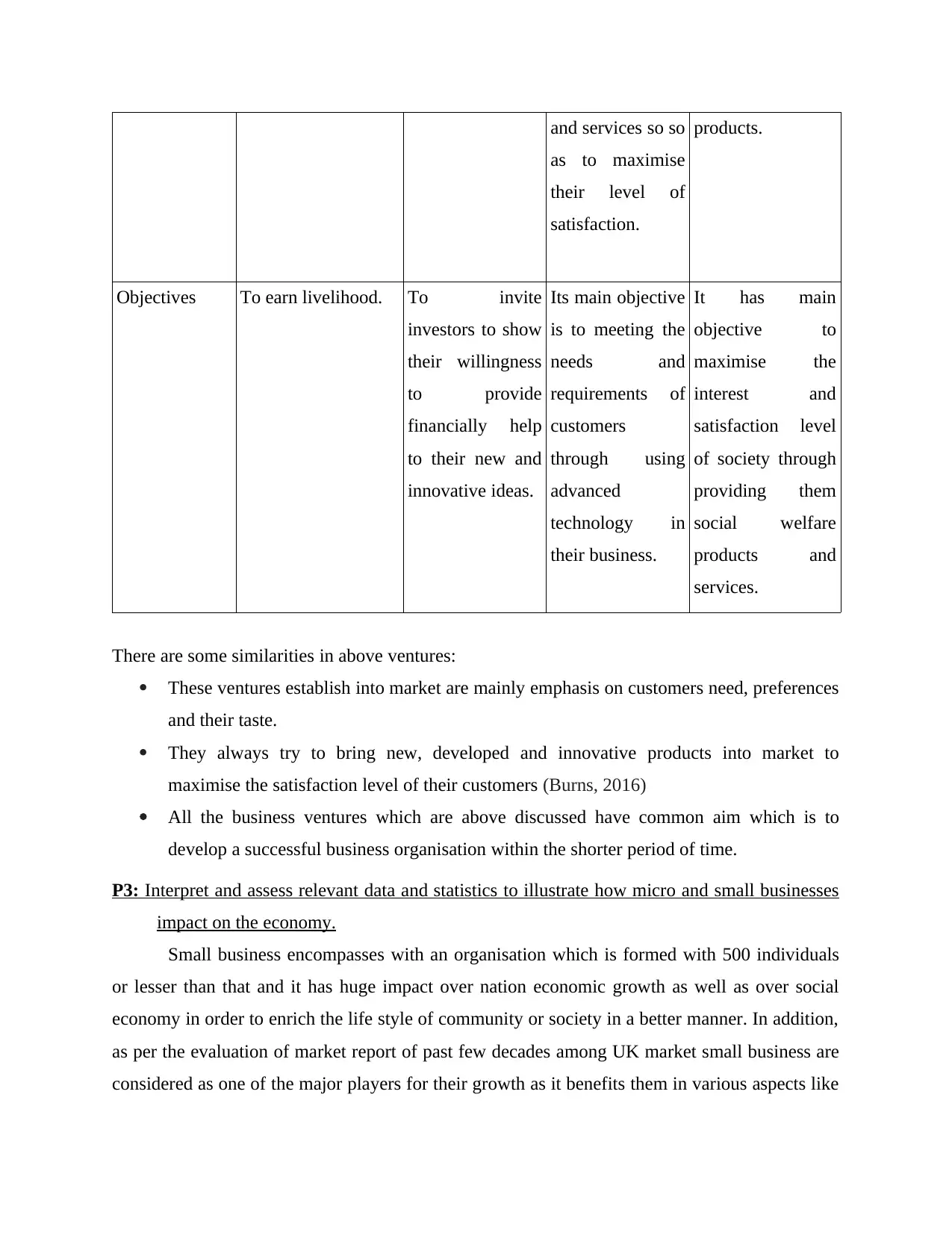
and services so so
as to maximise
their level of
satisfaction.
products.
Objectives To earn livelihood. To invite
investors to show
their willingness
to provide
financially help
to their new and
innovative ideas.
Its main objective
is to meeting the
needs and
requirements of
customers
through using
advanced
technology in
their business.
It has main
objective to
maximise the
interest and
satisfaction level
of society through
providing them
social welfare
products and
services.
There are some similarities in above ventures:
These ventures establish into market are mainly emphasis on customers need, preferences
and their taste.
They always try to bring new, developed and innovative products into market to
maximise the satisfaction level of their customers (Burns, 2016)
All the business ventures which are above discussed have common aim which is to
develop a successful business organisation within the shorter period of time.
P3: Interpret and assess relevant data and statistics to illustrate how micro and small businesses
impact on the economy.
Small business encompasses with an organisation which is formed with 500 individuals
or lesser than that and it has huge impact over nation economic growth as well as over social
economy in order to enrich the life style of community or society in a better manner. In addition,
as per the evaluation of market report of past few decades among UK market small business are
considered as one of the major players for their growth as it benefits them in various aspects like
as to maximise
their level of
satisfaction.
products.
Objectives To earn livelihood. To invite
investors to show
their willingness
to provide
financially help
to their new and
innovative ideas.
Its main objective
is to meeting the
needs and
requirements of
customers
through using
advanced
technology in
their business.
It has main
objective to
maximise the
interest and
satisfaction level
of society through
providing them
social welfare
products and
services.
There are some similarities in above ventures:
These ventures establish into market are mainly emphasis on customers need, preferences
and their taste.
They always try to bring new, developed and innovative products into market to
maximise the satisfaction level of their customers (Burns, 2016)
All the business ventures which are above discussed have common aim which is to
develop a successful business organisation within the shorter period of time.
P3: Interpret and assess relevant data and statistics to illustrate how micro and small businesses
impact on the economy.
Small business encompasses with an organisation which is formed with 500 individuals
or lesser than that and it has huge impact over nation economic growth as well as over social
economy in order to enrich the life style of community or society in a better manner. In addition,
as per the evaluation of market report of past few decades among UK market small business are
considered as one of the major players for their growth as it benefits them in various aspects like
⊘ This is a preview!⊘
Do you want full access?
Subscribe today to unlock all pages.

Trusted by 1+ million students worldwide
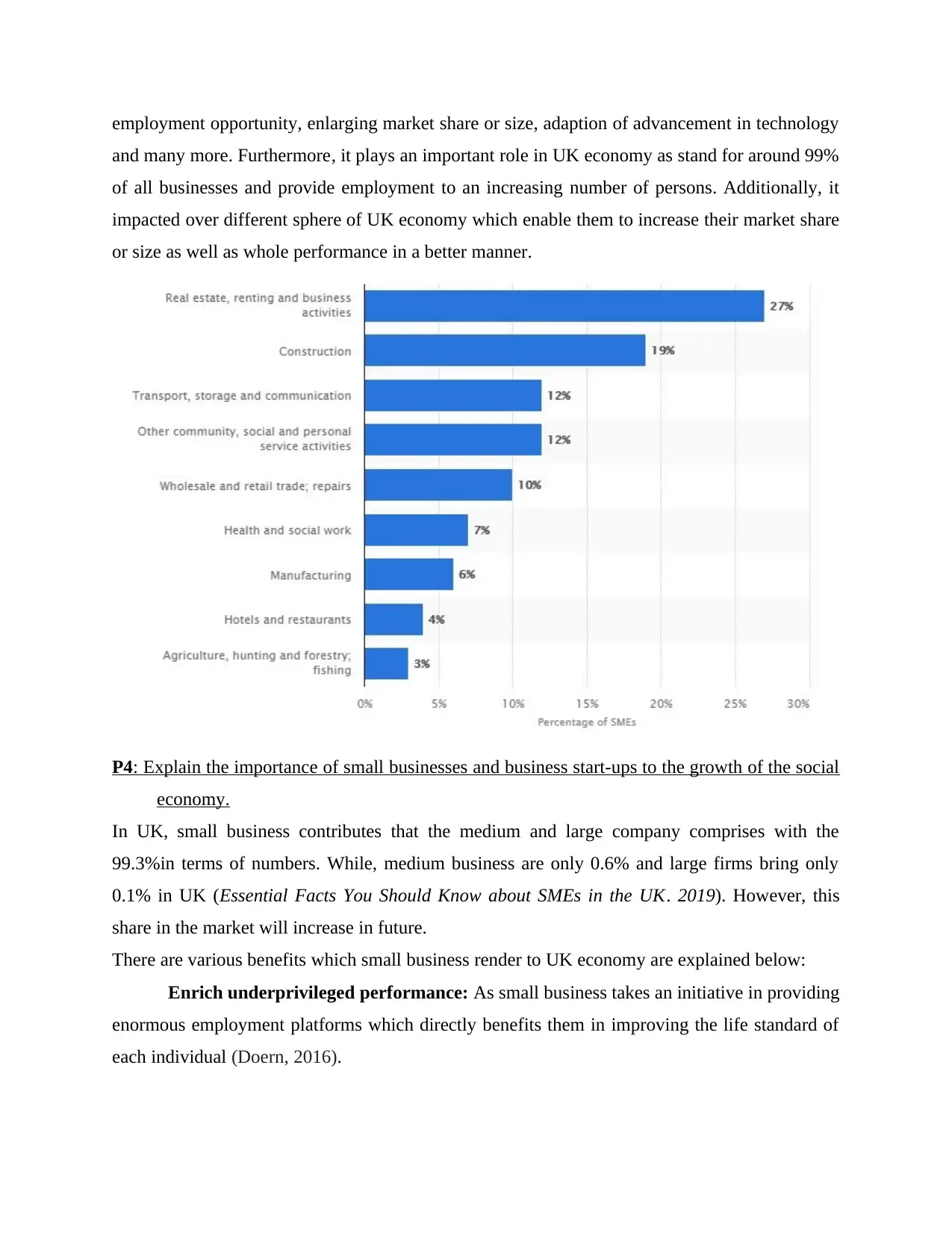
employment opportunity, enlarging market share or size, adaption of advancement in technology
and many more. Furthermore, it plays an important role in UK economy as stand for around 99%
of all businesses and provide employment to an increasing number of persons. Additionally, it
impacted over different sphere of UK economy which enable them to increase their market share
or size as well as whole performance in a better manner.
P4: Explain the importance of small businesses and business start-ups to the growth of the social
economy.
In UK, small business contributes that the medium and large company comprises with the
99.3%in terms of numbers. While, medium business are only 0.6% and large firms bring only
0.1% in UK (Essential Facts You Should Know about SMEs in the UK. 2019). However, this
share in the market will increase in future.
There are various benefits which small business render to UK economy are explained below:
Enrich underprivileged performance: As small business takes an initiative in providing
enormous employment platforms which directly benefits them in improving the life standard of
each individual (Doern, 2016).
and many more. Furthermore, it plays an important role in UK economy as stand for around 99%
of all businesses and provide employment to an increasing number of persons. Additionally, it
impacted over different sphere of UK economy which enable them to increase their market share
or size as well as whole performance in a better manner.
P4: Explain the importance of small businesses and business start-ups to the growth of the social
economy.
In UK, small business contributes that the medium and large company comprises with the
99.3%in terms of numbers. While, medium business are only 0.6% and large firms bring only
0.1% in UK (Essential Facts You Should Know about SMEs in the UK. 2019). However, this
share in the market will increase in future.
There are various benefits which small business render to UK economy are explained below:
Enrich underprivileged performance: As small business takes an initiative in providing
enormous employment platforms which directly benefits them in improving the life standard of
each individual (Doern, 2016).
Paraphrase This Document
Need a fresh take? Get an instant paraphrase of this document with our AI Paraphraser
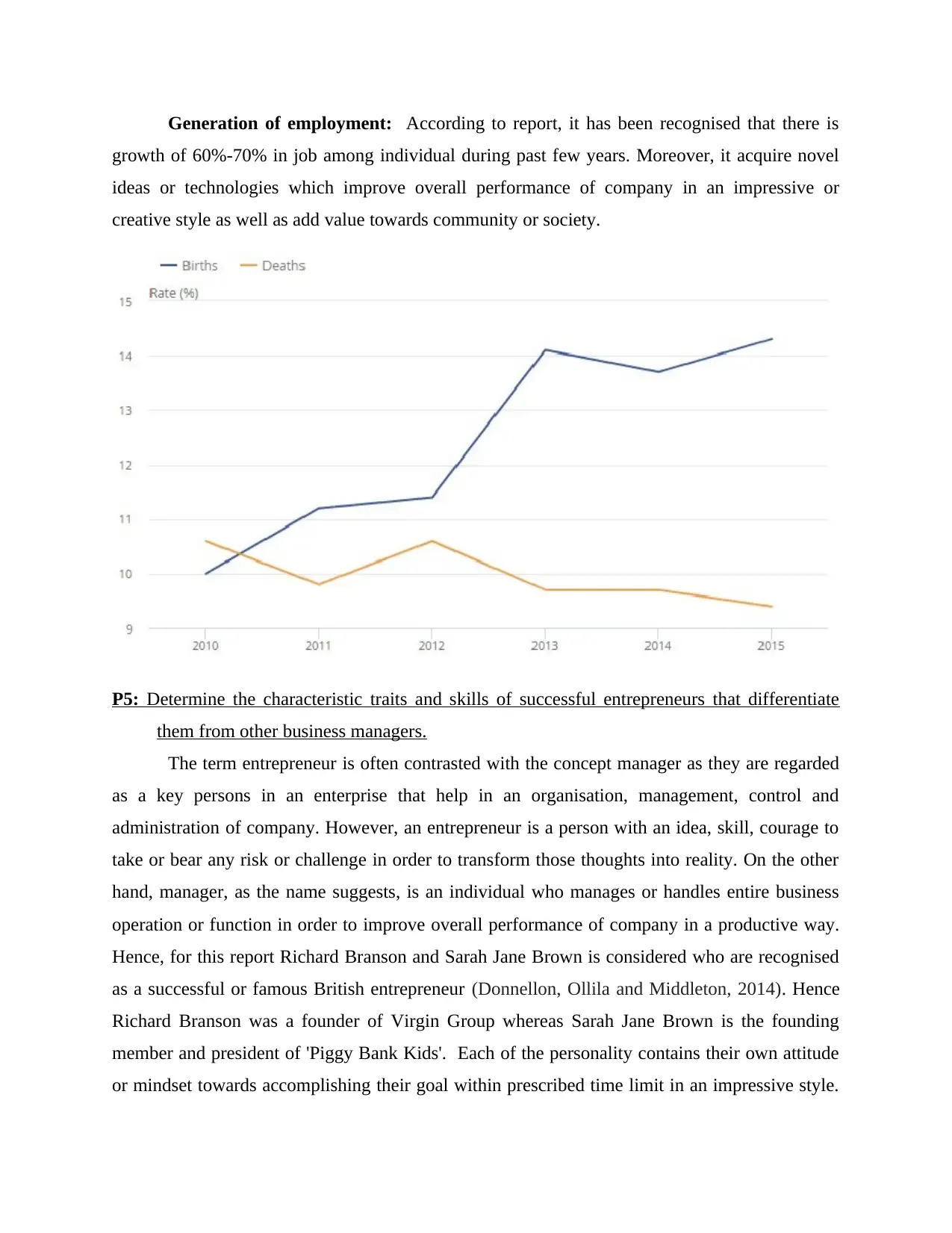
Generation of employment: According to report, it has been recognised that there is
growth of 60%-70% in job among individual during past few years. Moreover, it acquire novel
ideas or technologies which improve overall performance of company in an impressive or
creative style as well as add value towards community or society.
P5: Determine the characteristic traits and skills of successful entrepreneurs that differentiate
them from other business managers.
The term entrepreneur is often contrasted with the concept manager as they are regarded
as a key persons in an enterprise that help in an organisation, management, control and
administration of company. However, an entrepreneur is a person with an idea, skill, courage to
take or bear any risk or challenge in order to transform those thoughts into reality. On the other
hand, manager, as the name suggests, is an individual who manages or handles entire business
operation or function in order to improve overall performance of company in a productive way.
Hence, for this report Richard Branson and Sarah Jane Brown is considered who are recognised
as a successful or famous British entrepreneur (Donnellon, Ollila and Middleton, 2014). Hence
Richard Branson was a founder of Virgin Group whereas Sarah Jane Brown is the founding
member and president of 'Piggy Bank Kids'. Each of the personality contains their own attitude
or mindset towards accomplishing their goal within prescribed time limit in an impressive style.
growth of 60%-70% in job among individual during past few years. Moreover, it acquire novel
ideas or technologies which improve overall performance of company in an impressive or
creative style as well as add value towards community or society.
P5: Determine the characteristic traits and skills of successful entrepreneurs that differentiate
them from other business managers.
The term entrepreneur is often contrasted with the concept manager as they are regarded
as a key persons in an enterprise that help in an organisation, management, control and
administration of company. However, an entrepreneur is a person with an idea, skill, courage to
take or bear any risk or challenge in order to transform those thoughts into reality. On the other
hand, manager, as the name suggests, is an individual who manages or handles entire business
operation or function in order to improve overall performance of company in a productive way.
Hence, for this report Richard Branson and Sarah Jane Brown is considered who are recognised
as a successful or famous British entrepreneur (Donnellon, Ollila and Middleton, 2014). Hence
Richard Branson was a founder of Virgin Group whereas Sarah Jane Brown is the founding
member and president of 'Piggy Bank Kids'. Each of the personality contains their own attitude
or mindset towards accomplishing their goal within prescribed time limit in an impressive style.
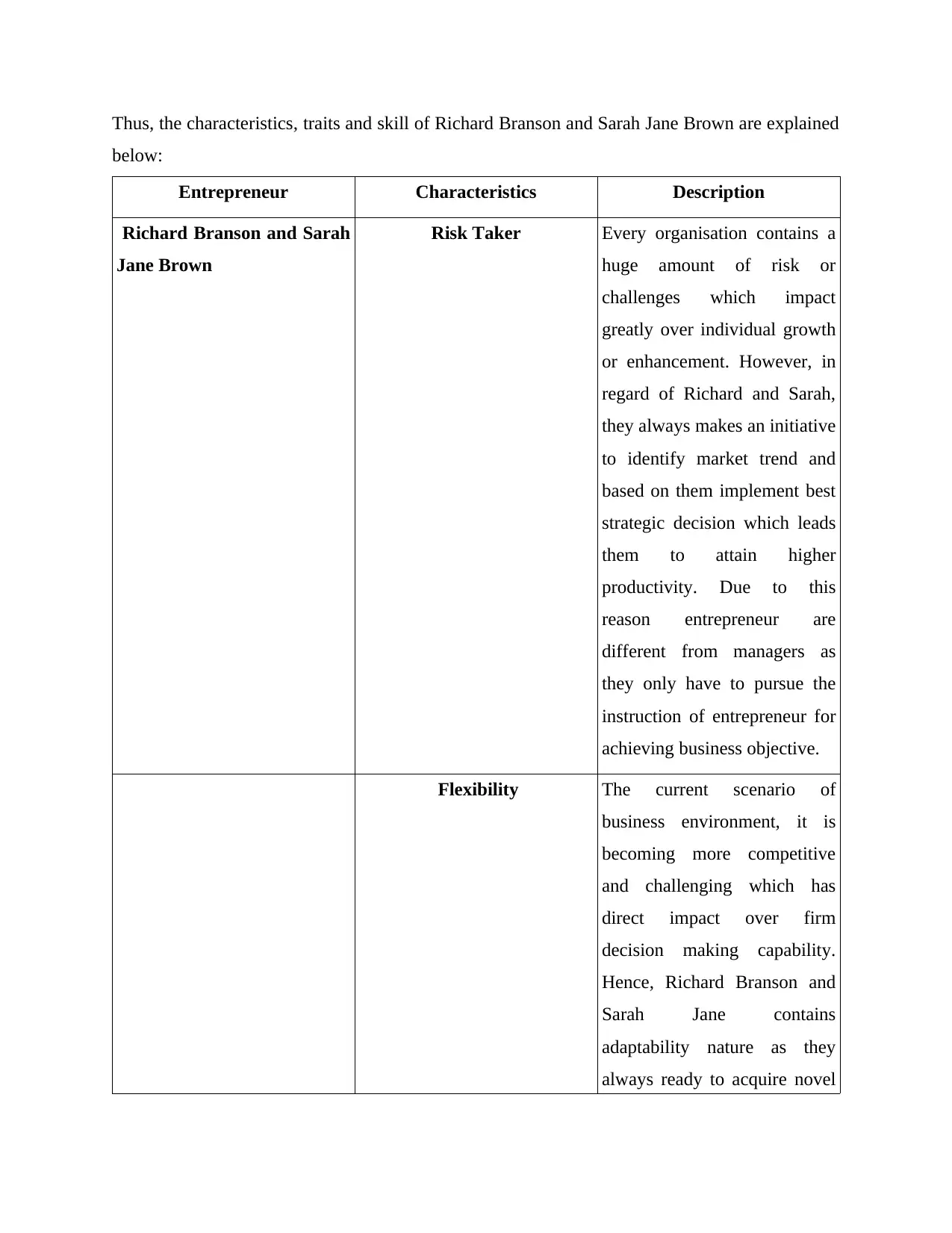
Thus, the characteristics, traits and skill of Richard Branson and Sarah Jane Brown are explained
below:
Entrepreneur Characteristics Description
Richard Branson and Sarah
Jane Brown
Risk Taker Every organisation contains a
huge amount of risk or
challenges which impact
greatly over individual growth
or enhancement. However, in
regard of Richard and Sarah,
they always makes an initiative
to identify market trend and
based on them implement best
strategic decision which leads
them to attain higher
productivity. Due to this
reason entrepreneur are
different from managers as
they only have to pursue the
instruction of entrepreneur for
achieving business objective.
Flexibility The current scenario of
business environment, it is
becoming more competitive
and challenging which has
direct impact over firm
decision making capability.
Hence, Richard Branson and
Sarah Jane contains
adaptability nature as they
always ready to acquire novel
below:
Entrepreneur Characteristics Description
Richard Branson and Sarah
Jane Brown
Risk Taker Every organisation contains a
huge amount of risk or
challenges which impact
greatly over individual growth
or enhancement. However, in
regard of Richard and Sarah,
they always makes an initiative
to identify market trend and
based on them implement best
strategic decision which leads
them to attain higher
productivity. Due to this
reason entrepreneur are
different from managers as
they only have to pursue the
instruction of entrepreneur for
achieving business objective.
Flexibility The current scenario of
business environment, it is
becoming more competitive
and challenging which has
direct impact over firm
decision making capability.
Hence, Richard Branson and
Sarah Jane contains
adaptability nature as they
always ready to acquire novel
⊘ This is a preview!⊘
Do you want full access?
Subscribe today to unlock all pages.

Trusted by 1+ million students worldwide
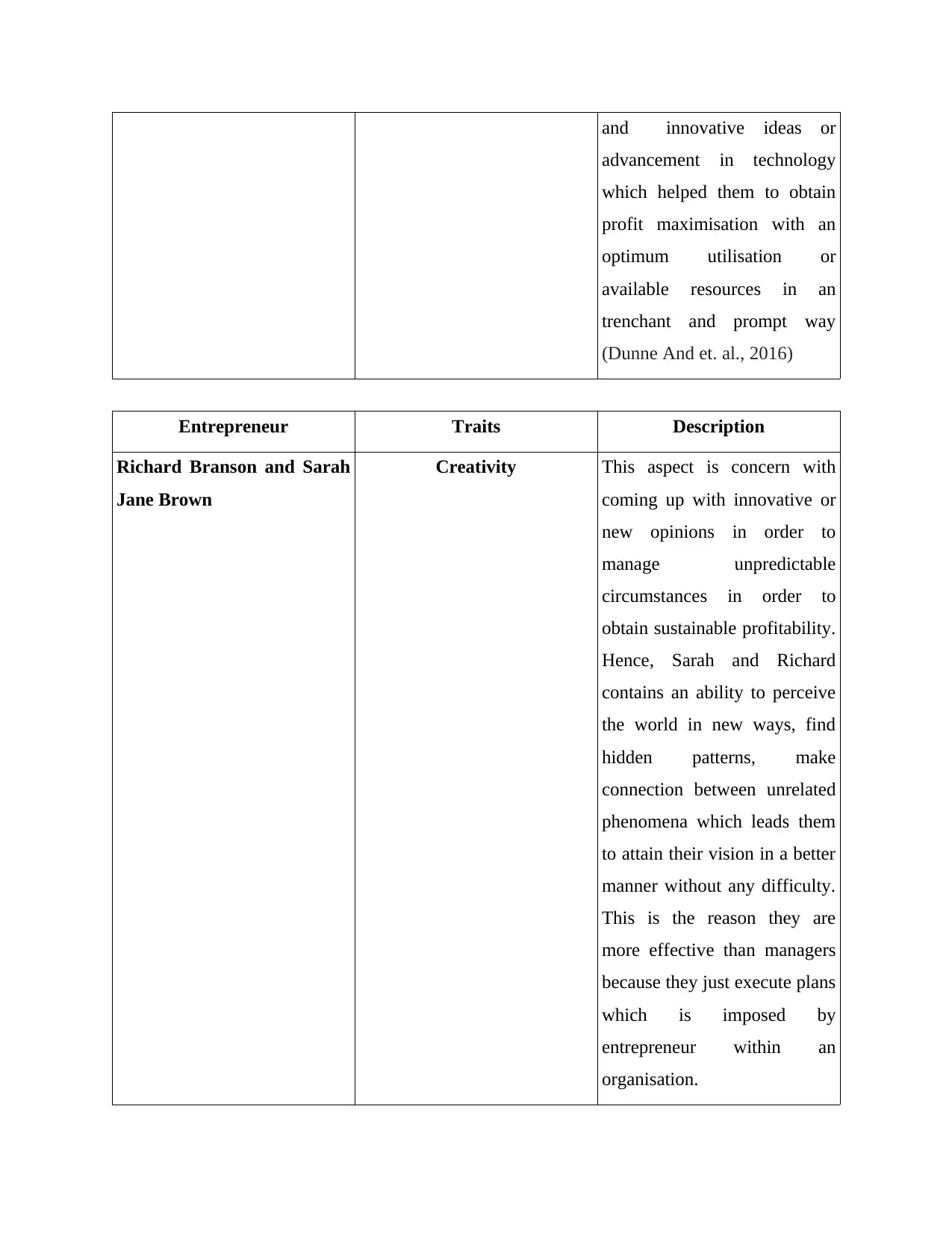
and innovative ideas or
advancement in technology
which helped them to obtain
profit maximisation with an
optimum utilisation or
available resources in an
trenchant and prompt way
(Dunne And et. al., 2016)
Entrepreneur Traits Description
Richard Branson and Sarah
Jane Brown
Creativity This aspect is concern with
coming up with innovative or
new opinions in order to
manage unpredictable
circumstances in order to
obtain sustainable profitability.
Hence, Sarah and Richard
contains an ability to perceive
the world in new ways, find
hidden patterns, make
connection between unrelated
phenomena which leads them
to attain their vision in a better
manner without any difficulty.
This is the reason they are
more effective than managers
because they just execute plans
which is imposed by
entrepreneur within an
organisation.
advancement in technology
which helped them to obtain
profit maximisation with an
optimum utilisation or
available resources in an
trenchant and prompt way
(Dunne And et. al., 2016)
Entrepreneur Traits Description
Richard Branson and Sarah
Jane Brown
Creativity This aspect is concern with
coming up with innovative or
new opinions in order to
manage unpredictable
circumstances in order to
obtain sustainable profitability.
Hence, Sarah and Richard
contains an ability to perceive
the world in new ways, find
hidden patterns, make
connection between unrelated
phenomena which leads them
to attain their vision in a better
manner without any difficulty.
This is the reason they are
more effective than managers
because they just execute plans
which is imposed by
entrepreneur within an
organisation.
Paraphrase This Document
Need a fresh take? Get an instant paraphrase of this document with our AI Paraphraser
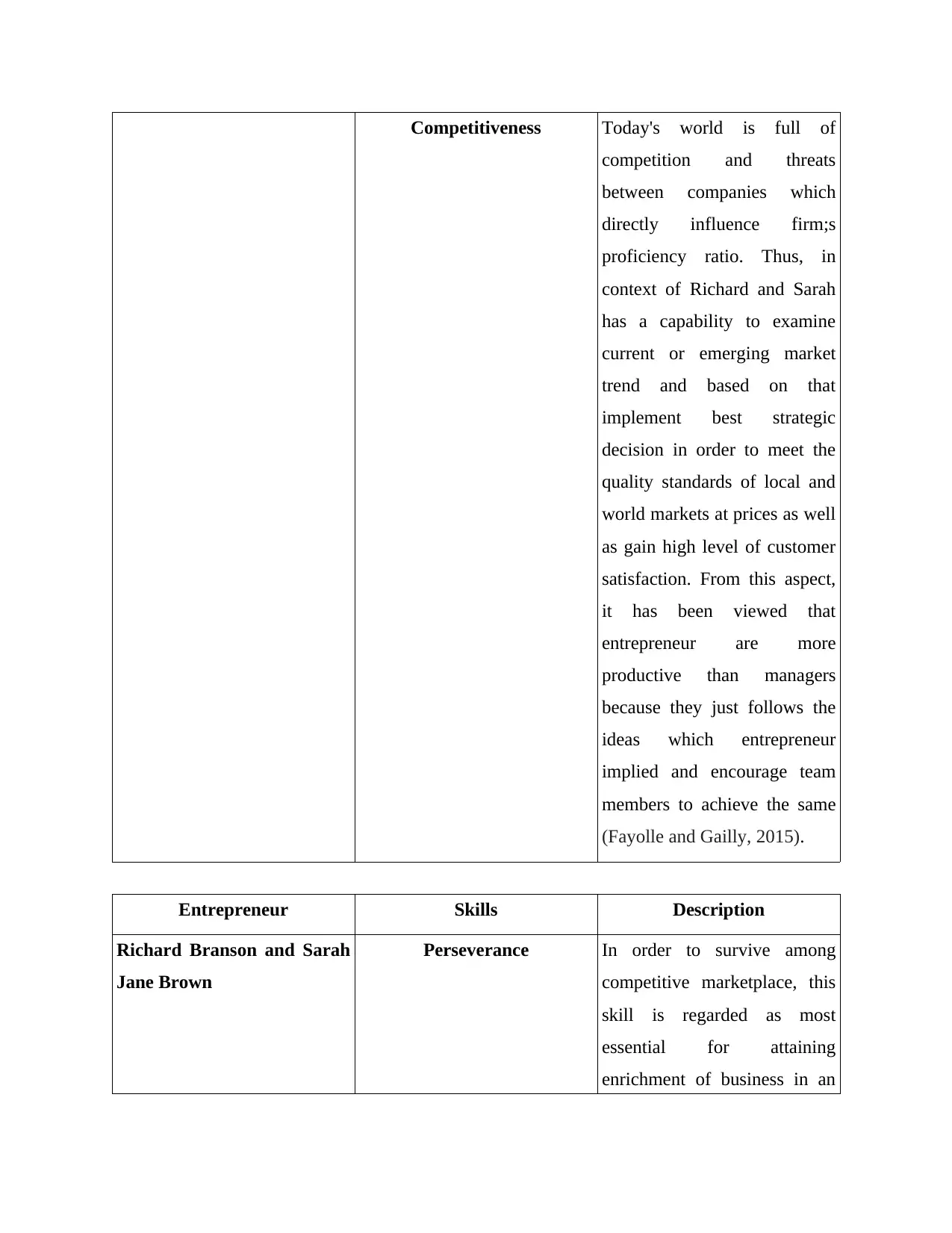
Competitiveness Today's world is full of
competition and threats
between companies which
directly influence firm;s
proficiency ratio. Thus, in
context of Richard and Sarah
has a capability to examine
current or emerging market
trend and based on that
implement best strategic
decision in order to meet the
quality standards of local and
world markets at prices as well
as gain high level of customer
satisfaction. From this aspect,
it has been viewed that
entrepreneur are more
productive than managers
because they just follows the
ideas which entrepreneur
implied and encourage team
members to achieve the same
(Fayolle and Gailly, 2015).
Entrepreneur Skills Description
Richard Branson and Sarah
Jane Brown
Perseverance In order to survive among
competitive marketplace, this
skill is regarded as most
essential for attaining
enrichment of business in an
competition and threats
between companies which
directly influence firm;s
proficiency ratio. Thus, in
context of Richard and Sarah
has a capability to examine
current or emerging market
trend and based on that
implement best strategic
decision in order to meet the
quality standards of local and
world markets at prices as well
as gain high level of customer
satisfaction. From this aspect,
it has been viewed that
entrepreneur are more
productive than managers
because they just follows the
ideas which entrepreneur
implied and encourage team
members to achieve the same
(Fayolle and Gailly, 2015).
Entrepreneur Skills Description
Richard Branson and Sarah
Jane Brown
Perseverance In order to survive among
competitive marketplace, this
skill is regarded as most
essential for attaining
enrichment of business in an
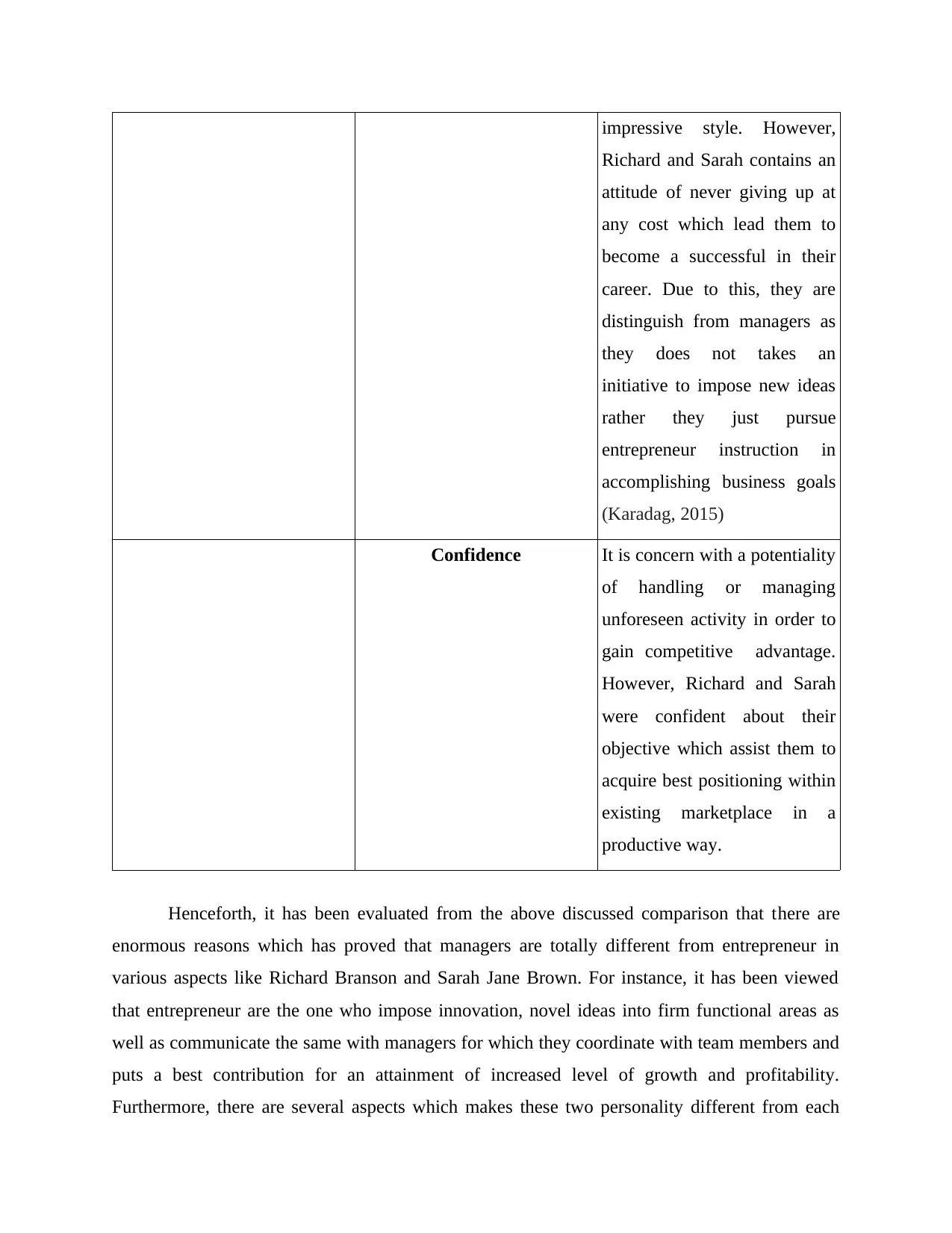
impressive style. However,
Richard and Sarah contains an
attitude of never giving up at
any cost which lead them to
become a successful in their
career. Due to this, they are
distinguish from managers as
they does not takes an
initiative to impose new ideas
rather they just pursue
entrepreneur instruction in
accomplishing business goals
(Karadag, 2015)
Confidence It is concern with a potentiality
of handling or managing
unforeseen activity in order to
gain competitive advantage.
However, Richard and Sarah
were confident about their
objective which assist them to
acquire best positioning within
existing marketplace in a
productive way.
Henceforth, it has been evaluated from the above discussed comparison that there are
enormous reasons which has proved that managers are totally different from entrepreneur in
various aspects like Richard Branson and Sarah Jane Brown. For instance, it has been viewed
that entrepreneur are the one who impose innovation, novel ideas into firm functional areas as
well as communicate the same with managers for which they coordinate with team members and
puts a best contribution for an attainment of increased level of growth and profitability.
Furthermore, there are several aspects which makes these two personality different from each
Richard and Sarah contains an
attitude of never giving up at
any cost which lead them to
become a successful in their
career. Due to this, they are
distinguish from managers as
they does not takes an
initiative to impose new ideas
rather they just pursue
entrepreneur instruction in
accomplishing business goals
(Karadag, 2015)
Confidence It is concern with a potentiality
of handling or managing
unforeseen activity in order to
gain competitive advantage.
However, Richard and Sarah
were confident about their
objective which assist them to
acquire best positioning within
existing marketplace in a
productive way.
Henceforth, it has been evaluated from the above discussed comparison that there are
enormous reasons which has proved that managers are totally different from entrepreneur in
various aspects like Richard Branson and Sarah Jane Brown. For instance, it has been viewed
that entrepreneur are the one who impose innovation, novel ideas into firm functional areas as
well as communicate the same with managers for which they coordinate with team members and
puts a best contribution for an attainment of increased level of growth and profitability.
Furthermore, there are several aspects which makes these two personality different from each
⊘ This is a preview!⊘
Do you want full access?
Subscribe today to unlock all pages.

Trusted by 1+ million students worldwide
1 out of 16
Related Documents
Your All-in-One AI-Powered Toolkit for Academic Success.
+13062052269
info@desklib.com
Available 24*7 on WhatsApp / Email
![[object Object]](/_next/static/media/star-bottom.7253800d.svg)
Unlock your academic potential
Copyright © 2020–2026 A2Z Services. All Rights Reserved. Developed and managed by ZUCOL.


![Entrepreneurship and Small Business Impact Report - [University Name]](/_next/image/?url=https%3A%2F%2Fdesklib.com%2Fmedia%2Fimages%2Fwj%2Fd1f42599211847658d3fd556aa563fa5.jpg&w=256&q=75)


